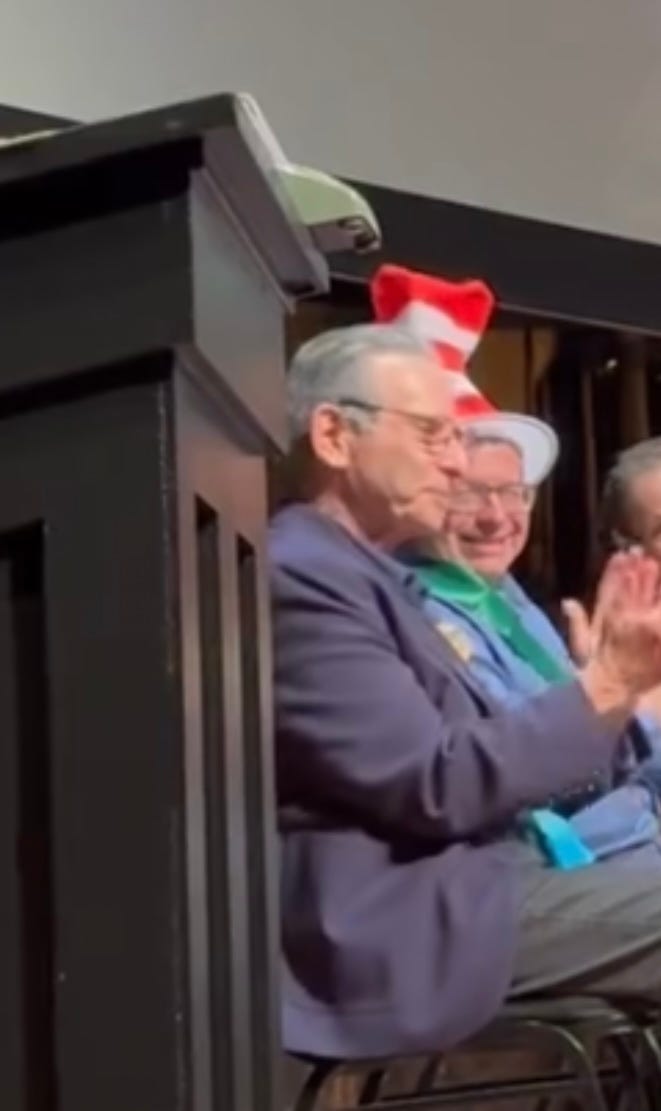"Stupid Candidate Tricks
Election got you down? As a Portland mayoral candidate says, “tough titty.”
“Oct 19, 2024
Portland politics is looking more and more like a TV gameshow. Complete with the “Jeopardy” tick-tock theme.
“Of all counties larger than 65,000 residents, Multnomah County is home to the largest population of what?” asked Luke Burbank, normally host of public radio’s “Live Wire” but on this night host of “Portland Is Possible,” a forum for selected City Council candidates invited to participate.
The gameshow format was used to show how candidates from the city’s new geographic council districts can work together and come up with answers.
That first question went to two teams — one composed of candidates Jamie Dunphy of East Portland (District 1); Mariah Hudson of North/Northeast Portland (District 2); Angelita Morillo of Southeast Portland (District 3); and Mitch Green of West/Southwest Portland (District 4). They huddled and came up with this answer: White people.
The second team composed of candidates Terrence Hayes of East Portland (District 1); Nat West of North/Northeast Portland (District 2); Jesse Cornett of Southeast Portland (District 3) and Chad Lykins of West/Southwest Portland (District 4) came up with this answer: James Beard Award winners.
Wrong on both counts.
“We were looking for ‘lesbian couples,’” Burbank said. Multnomah County is home to the largest population of lesbian couples.
Both teams nailed the second question: Portland was the 15th city to get what? A WNBA team!
At the beginning of this “sold-out” show at Portland Center Stage, Burbank told the audience that “Sweeney Todd” is being staged at the theater. If anybody tried to turn the evening into a serious debate, “I will throw their ass in a meat pie.”
That got a good laugh.
Sponsored by North Star Civic Foundation and several other organizations, the “Portland Is Possible” candidate showcase was designed to reimagine Portland in an unconventional fashion.
“We want to be progressing forward to the future of Portland,” Burbank said to loud applause.
With 98 city council and 19 mayoral candidates running under Portland’s new system of government, many campaign forums have had to be selective about who they can invite. Typically, candidates have been selected by various standards, in come cases related to number of donors and funds raised.
Equity is popular with Portland’s progressive candidates. Have any of them who are more donor-rich voluntarily sacrificed a forum appearance to a candidate who has been excluded for lack of funds? It seems doubtful.
When Burbank asked the audience which council districts they lived in, there was a hint of — was it pride or something else? In this particular audience, District 1 was represented with polite applause, District 2 a little more, District 3 a resounding roar and District 4 (which is where the forum took place) another healthy round of applause.
Besides the Jeopardy-style questions, the candidates were given “constituent tests.” A pre-selected “constituent” would pose a problem, and the candidates would have to work out a solution. Each candidate would offer a suggestion, then pass the mic to the next candidate who was supposed to start their answer with “Yes, and …” then give their suggestion.
The “Yes and” fell quickly by the wayside. But the exercise had merit since constituent service is supposed to be a big part of serving on the new council. The constituents were atypical, though, particularly JT Flowers of Albina Vision Trust. This is the organization that received $400 million from Nike co-founder Phil Knight towards restoring the Albina neighborhood, an historic part of Portland’s black community.
Any constituent who has access to Phil Knight will not have to fight for access to City Hall. Flowers’ constituent question was how would the candidates ensure that the work to rebuild Albina would be shared by the city “rather than borne on the shoulders of the black community.”
The Oregon state legislature has given Albina Vision Trust $25 million, and another $455 in federal funds will go towards the project. Among the answers offered by some of the candidates:
Ben Hufford/District 4: Build intergenerational wealth by constructing condos and co-ops, and “bury the freeway so it’s not in your way.”
Chris Flanary/District 3: “If it is not in the budget … make sure it does not fall on the black shoulders.” (Apparently Flanary didn’t know the white shoulders of Knight and the taxpayers already had done some heavy lifting.)
Steph Routh/District 1: Make sure there is a dashboard in the works to monitor progress, and make sure “you celebrate black joy.”
Candace Avalos/District 1: “No about us without us.” (This buzz phrase means no policy decision should be made without involving those who will be affected. However, in Portland it is not equally applied. The Portland Police Bureau was excluded from the 20-member Police Accountability Commission, which designed a new oversight system for law enforcement. It later had to be reworked.)
Another atypical constituent was Courtney Taylor-Taylor, lead singer of the alternative rock band Dandy Warhols. His issue: “Why are there no music classes in middle school? … I don’t know how many schools we have without music.”
None of the city council candidates suggested that Taylor-Taylor might want to take his issue to the school board. Among the solutions offered:
Olivia Clarke/District 4: “We should support all of our arts.”
Tiffany Lane/District 3: “We should have arts and music.”
Commissioner Dan Ryan/District 2 (the only incumbent running): “Music is part of the core curriculum.”
Steve Novick/District 3 (sporting a tall, red and white striped Cat in the Hat), yelled: “Keep Live Nation out of Portland!” The crowd cheered.
Loretta Smith/District 1, dropped a small bombshell: “A Music Tax?” she ventured. Maybe $25?
“A Music Tax is not the best sounding thing,” replied Taylor-Taylor.
Eventually it was time for the top five mayoral candidates to take the stage. Commissioner Carmen Rubio got the biggest cheers, and Commissioner Rene Gonzalez got the biggest jeers. (The way things work in Portland, it could be his supporters were afraid to show their feelings.)
The mayoral candidates were spared the Jeopardy game and constituent issues, but were required to give oral renditions of statements written by presumably younger writers, heavy on popular slang. The candidates were good sports, but at this point the event was moving into its third hour.
They were each asked about their big dream for Portland.
“In 10 years we can make Portland carbon neutral,” said Commissioner Mingus Mapps. He also wants to “eliminate the role that race plays in this city.”
When Gonzalez’s turn came, someone yelled, “Sit down, dude!”
Gonzalez remained standing. He told the audience he would like to be the standard bearer for public safety.
“I want to make it a safe city again … proud of being a Portlander again.”
Keith Wilson, CEO/President of TITAN Freight Systems, said his big idea is “high speed rail between here and Seattle.” It’s doable, and he had the legislative background at his fingertips.
To more cheers, Rubio said, “This city has given me so much. … We have work to do … When we attack our issues together, we get amazing things done. … Our best days are ahead of us.” She envisioned an inclusionary city that remembers its values and takes care of everyone.
Liv Østhus, an author, musician and stripper said it’s time for different leaders to lead. A mayor has to to be able to talk to Portlanders of every background.
When a former City Hall policy advisor asked the candidates what is the most important power of the mayor, Østhus elaborated that the new mayor should be a listener who can connect with everybody.
“This is something that strippers all do,” she said. She later compared Mary’s Club (where she used to dance) to the Liberty Bell — a place that visitors from out-of-town come to visit.
A week earlier, a City Club mayoral candidate was held in a very different venue — Sanctuary Hall in the First Congregational church in the downtown park blocks. Like the “Portland Is Possible” event, the phrase “progressive values” seemed to hang in the air. At one point, Rubio suggested hiring more police officers “trained in Portland values."
Moderated by Jeff Mapes, former political reporter for The Oregonian and OPB, there were decisive differences on how to handle the homeless.
Wilson, Rubio and Østhus avoided linking homelessness with drugs and crime. They talked about building more shelters and housing and responding with compassion.
Gonzalez and Mapps looked at the full extent of the problem.
Being homeless is not a get-out-of-jail card, said Mapps. The city needs to enforce drug laws and bans on public camping and public use of drugs.
“We must enforce those bans,” Gonzalez said.
Wilson was opposed to “blowing up” the city’s homeless services agreement with Multnomah County. He acknowledged, “we are not making progress,” especially when compared to cities like Boise, Philadelphia and Boston.
Wilson maintains he has a roadmap to house all unsheltered people in Portland by providing enough nighttime emergency shelters using various trauma-informed facilities, community centers, churches and businesses. (Note: City Council candidate Novick has suggested using golf courses.)
Gonzalez said Wilson’s comparisons to Massachusetts and Idaho don’t take into consideration that those states have much better behavioral health systems.
He summed up Wilson’s plan: It will bring chaos.
Although three city commissioners are running for mayor, the post appears to be somewhat diminished under the new system. The mayor will no longer have a vote, except to break a tie. He or she will hire a city administrator to carry out the day-to-day management of the city. The mayor will carry out the policies enacted by the new city council, which will grow from five members elected city-wide to 12 members elected in four geographic districts.
Mapes posed this question to the would-be mayors: What if the new 12-member city council develops an entire policy that you don’t support. How are you going to make sure you are effective in carrying it out?
“If you don’t like what they’re passing tough titty, I guess,” Østhus said. There was a light gasp in the audience, like someone had been slapped in the face.
Rubio sees the new role as a once-in-a-lifetime opportunity — “creating blueprints for the next generation.”
Wilson said if he receives a policy from the council that he doesn’t like, “it is my prerogative to not like it, but it is my requirement to make it work. … There is no perfect law. … We make the laws work for all of us.”
Gonzalez didn’t agree with the underlying assumption of the question. If the new mayor wants to, he or she could do nothing but ribbon cuttings. But he believes the new mayor will be stronger. Substantial authority will reside in that person if he wants to exercise it. Gonzalez envisions himself being very assertive on public safety.
“Don’t let special interests dictate policy. … Center on the voice of voters,” Gonzalez said.
As Commissioner Mapps said at the beginning of the forum, “this is most unique and most important election Portland has seen in the last 100 years.”
It also remains one of the most confusing. During the summer, City Club held Ranked Choice Voting workshops and posted video on its website.
“Portland Is Possible” also gave a quick lesson in how it works and may have inadvertently revealed its intended consequences.
Leah Benson, Ranked Choice Voting Project Manager at Multnomah County, had audience members order a three-topping pizza by ranking ingredients. A couple of hours later, she showed the results: Voters selected mozzarella cheese as No. 1, then Mama Lil’s peppers as No. 2. There were various other options of lesser rankings.
The ingredients at the bottom of the rankings disappeared outright, while mozzarella and Mama Lil’s lost some of their percentages as the other ingredients acquired higher rankings from votes being moved around. Eventually, the more “boring ingredients,” as Benson put it, were eliminated.
After further machinations, a more interesting ingredient emerged in third place — pistachio pesto.
Finally, the mozzarella, Mama Lil’s and pistachio pesto pizza was delivered to Portland Center Stage by the Portland Unipiper.
Just like the good old days — when Portland was weird.”
By Pamela Fitzsimmons
~Theresa Griffin Kennedy













"Stupid Candidate Tricks," by journalist Pamela Fitzsimmons!